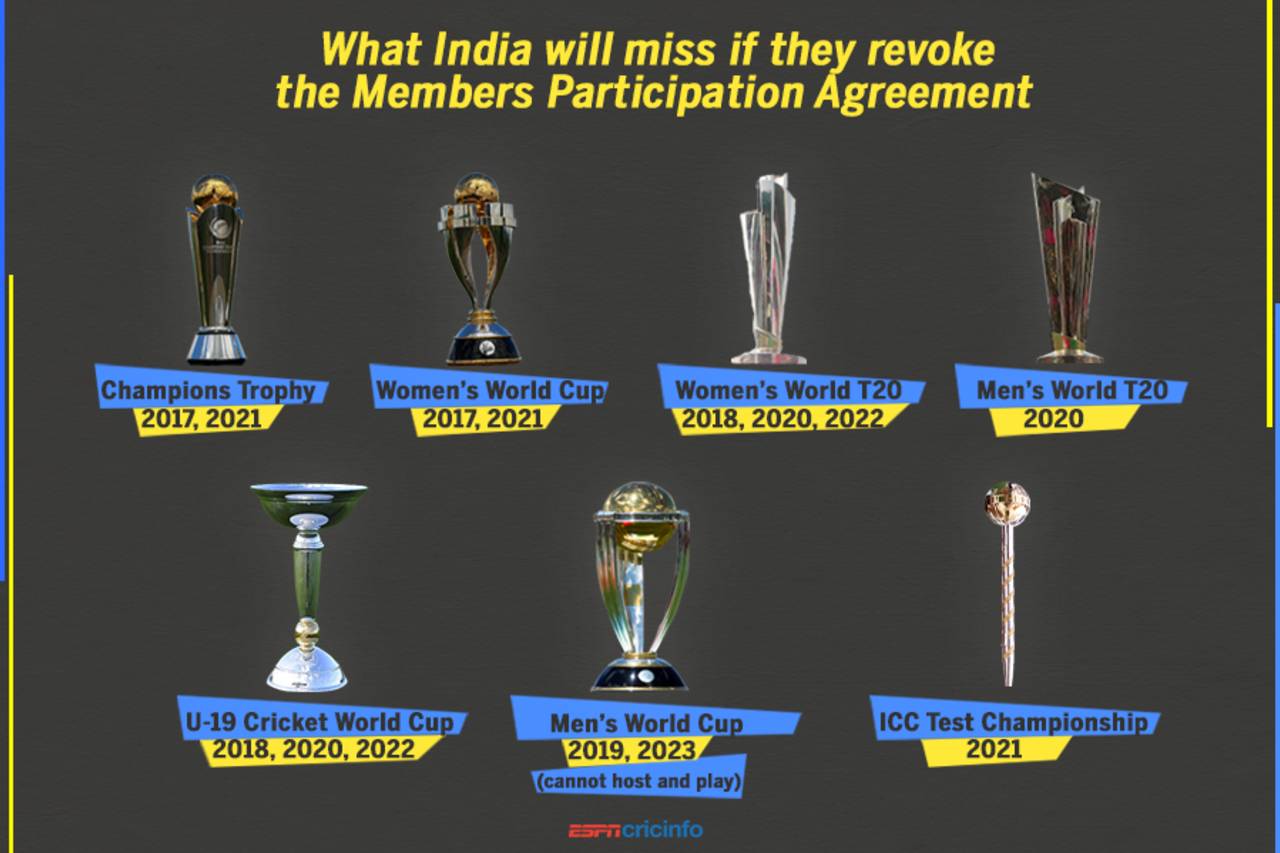'Drastic steps may jeopardise ICC negotiations'
The Committee of Administrators has said it will intervene if it feels the BCCI's decision at the upcoming SGM hurts the interests of Indian cricket
Nagraj Gollapudi
03-May-2017

ESPNcricinfo Ltd
The committee of administrators (CoA) appointed by the Supreme Court to oversee the BCCI will not hesitate to intervene if it feels that decisions taken by the board at this weekend's special general meeting are going to hurt the interests of Indian cricket.
In an email to state associations ahead of the SGM on May 7, the CoA issued a thinly veiled warning that it would take the matter to the Supreme Court if BCCI took a "drastic step/measure," which could "jeopardise" ongoing negotiations with the ICC.
The BCCI called the SGM to update state associations on the outcomes of the April round of ICC Board meetings - the second SGM called by the BCCI in less than a month. At the previous one on April 18, the BCCI had authorised its acting secretary Amitabh Choudhary to ask the ICC Board to defer any decision on the new constitution, governance structure and the new finance model. Choudhary did so and also argued that the BCCI should get $570 million as its share from ICC tournaments in the 2015-23 right cycle.
His request was rejected, though, and the BCCI was outvoted as the ICC passed the new constitution and finance model. The BCCI now stands to get $293 million as its share (the amount is based on the ICC earning a projected revenue of $2.7 billion).
Some BCCI office bearers and state associations now want to take an aggressive stance and have threatened to revoke the Members Partnership Agreement (MPA) signed by the Indian board and ICC in 2014. A dozen state associations including two BCCI office-bearers - Choudhary and board treasurer Anirudh Chaudhry - wanted to send the ICC a legal notice challenging the decisions taken last week, a move thwarted by the CoA.
If the BCCI was to revoke the MPA, then India will pull out of the Champions Trophy, which starts on June 1 in England. Pre-empting such a decision, the CoA sought a more collaborative approach.
"It is in the interests of Indian cricket for the BCCI to continue negotiations with the ICC and other cricket boards to arrive at an amount/ share that is somewhere between that envisaged under the financial model that was put in place in 2014 and that which is envisaged under the revised financial model," the CoA said in an email to the state associations on Wednesday.
Being aggressive, the CoA said, would only harm the BCCI's cause. "It is not in the interests of Indian cricket for the BCCI to take any drastic step/measure which may result in breakdown of negotiations between the BCCI, ICC and other cricket boards, especially since there is sufficient time between now and the ICC Conference to be held in June 2017 for a negotiated outcome to be arrived at."
The CoA would, the email said, support any decision taken by the BCCI as long as it was unanimous and protected the interests of Indian cricket.
"In the extremely unlikely event that the decision of the Members of BCCI at the SGM is one which, in our view, is against the interests of Indian cricket, we would be duty bound to bring such decision to the attention of the Hon'ble Supreme Court, communicate our views to the Hon'ble Supreme Court and seek its intervention in the matter as also to take such other steps that we consider necessary to protect the interests of Indian cricket."
In an attempt to make the state associations understand the gravity of the situation, the CoA laid out the sequence of events leading to last week's ICC Board meeting. In its discussions with ICC chairman Shashank Manohar and various member board representatives, the CoA was told about the vast "trust deficit" that had developed between them and the BCCI after the Big Three became a reality in early 2014. While acknowledging that the BCCI contributed "much more" to the ICC, member boards said their share in the Big Three model was "too high and unacceptable".
Instead, an acceptable figure lay somewhere between the Big Three model and the ICC's revised finance model. The ICC's members were keen to sort out the issue through negotiations rather than a vote, and the CoA told Choudhary that a "lack of flexibility" at the ICC Board meetings would not serve the BCCI well.
"The decision regarding what amount/share and changes to the ICC governance structure the BCCI should finally agree to in the course of negotiations with the ICC and other cricket boards is certainly one that needs to be taken by the General Body of the BCCI as it has long term implications," the CoA said.
"It is extremely unlikely that the ICC and other cricket boards will agree to the amount/ share envisaged under the financial model that was put in place in 2014. The ICC and other cricket boards will certainly agree to an amount/ share that is higher than what is envisaged under the revised financial model."
The CoA also warned that if the talks failed it could have a negative impact on the observations made by the BCCI - through its CEO Rahul Johri - on the new governance structure, which was also approved by the ICC Board. Johri had expressed reservations on the scheduling of bilateral tours, membership criteria, the powers of the ICC chairman, and the composition of committees in an email to the ICC in March.
Nagraj Gollapudi is a senior assistant editor at ESPNcricinfo